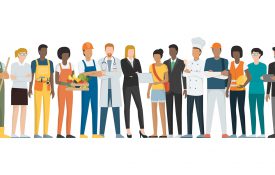-
Art for the Knowing Nose
The New York Times: Peter De Cupere’s “Tree Virus” sculpture wasn’t much to look at: a dead, black tree rooted in a craggy white ball suspended over a dirt pit, all of it covered by a plastic igloo. Built on a college campus in the Netherlands in 2008, the whole thing might have been leftover scenery from a Tim Burton film if it weren’t for the outrageous smell. Inside the igloo, a heady mix of peppermint and black pepper saturated the air. It flooded the nose and stung the eyes. Most visitors cried; many ran away. Others seemed to enjoy it, laughing through the tears. ... Smell has an unfair advantage over the other senses when it comes to eliciting a response, researchers say.
-
New psychology study shows ‘extroversion bias’ distorts our view of friends
The Sydney Morning Herald: When it comes to popularity, most of us would rather be Glinda than Elphaba. "It's not about aptitude, it's the way you're viewed," the desired but ditzy witch sings in the musical Wicked. "So it's very shrewd to be very, very popular - like me!" Yet so often people feel that those around them have more friends than they do. The "friendship paradox", as the phenomenon has been labelled, is based on the fact that we are more likely to be friends with someone who has lots of friends than someone who has few. A new study has found the paradox is not just mathematical, but borne out in the social lives of everyday people.
-
A Shakespeare Play You’ve Never Heard Of
Pacific Standard: “What’s in a name?” William Shakespeare asks in Romeo and Juliet. “That which we call a rose by any other name would smell as sweet." By that logic, it matters little whose name is attached to the play Double Falsehood, which was published in 1728 and is practically unknown today. If it’s a well-written, compelling work, it should get produced no matter who wrote it. In reality, however, we’re uniquely drawn to plays thought to be authored by the Bard of Avon. If he is, as many assert, the greatest writer in the English language, anything he penned is automatically of interest. Read the whole story: Pacific Standard
-

Childhood Self-Control Linked to Enhanced Job Prospects Throughout Life
Children with high self-control — who are typically better able to pay attention, persist with difficult tasks, and suppress inappropriate or impulsive behaviors — are much more likely to find and retain employment as adults.
-
Online dating’s age wars: Inside Tinder and eHarmony’s fight for our love lives
The Washington Post: Tinder, America’s fast-growing online-dating juggernaut, last week unveiled its first big branding partnership aimed at its core audience of millennial fling-seekers: a neon-drenched video-ad campaign hyping Bud Light’s mega-keg party, “Whatever, USA.” Meanwhile, over at Tinder’s less-youthful rival eHarmony, a recent ad saw its 80-year-old founder counseling a single woman besieged by bridesmaid’s invitations to take some time (and, of course, the site’s 200-question compatibility quiz) to find that special someone: “Beth, do you want fast or forever?” ...
-

Acetaminophen May Reduce Both Pain and Pleasure
The commonly used pain reliever acetaminophen may have a previously unknown side effect: Blunting positive emotions.

